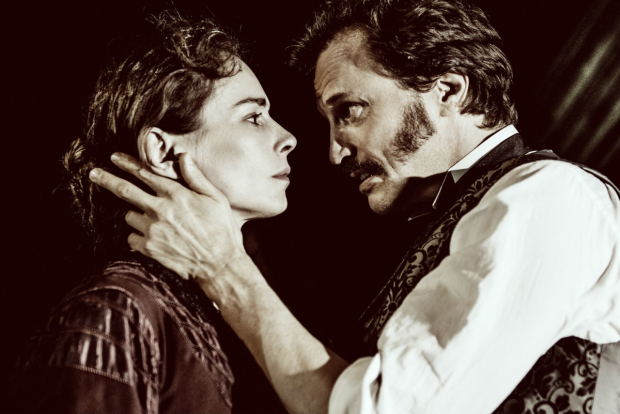Michael Coveney: Love is in the air
What will survive of us is love, wrote Philip Larkin in his poem composed on considering the stone tombs and effigies in Arundel Cathedral. The line bobbed up for me last Saturday as the train from Victoria traced a line around that ecclesiastical edifice and the castle in a Sussex landscape en route to David Hare‘s trilogy of Chekhov adaptations in Chichester.
Young Chekhov: The Birth of a Genius has proved one of the year’s theatrical highlights, an irresistible demonstration of Chekhov’s progress from the wild romanticism of Platonov and Ivanov through the first of his "great last quartet" The Seagull. All three plays are about love: its cruel pursuit and manifestation, its kinks and injustices, its expression and suppression, its glorious moments and its hopeless disintegration. All of these phenomena Chekhov knew. And he knew them because he was young. He never grew old. He died aged 44.
And Chekhov’s genius lay in his ability to find dramatic strategies, and characters, to anatomise these qualities and effects of love. I think David Hare responds to these plays, and re-writes them so well (using the literal translations of Helen Rappaport and Alex Wilbraham) because he, too, is a dramatist of love, and an unreconstructed romantic. Like Chekhov, he examines social constructs and patterns of behaviour through the spiritual life of his protagonists.
Love is too big a word, of course, but it defines how we look at the world, and make our dealings with other people, and it’s the soul, or spirit, of characters on the stage to which we respond, as in "real" life. When Kenneth Tynan said that he could not love anyone who did not want to see Look Back in Anger you understand exactly what he meant. Love changes everything, as Michael Ball sang in Aspects of Love.
Most opera critics have disliked Benedict Andrews's revival of La bohème at ENO, picking out the heroin injection Rodolfo dispenses to himself and Mimi at the end of the first act. There are no other needles in the show and Mimi dies, as usual, coughing. The injection signals a rush of the most glorious love music and the hallucinatory efflorescence of it seems absolutely perfect. It’s a one-off.
But, even in a "verismo" opera, with the naturalistic acting and behaviour of the characters skilfully maintained in a modern setting – no mean feat, with these gangly, over-age male students – we can surely allow the metaphor of this theatrical invention. Rodolfo and Mimi are literally infected with love and complete their erotic duet while embracing each other on the floor.
There was a time when singers in opera never sang in such extreme physical circumstances, or at least moaned about being asked to do so. Now it happens in almost every opera you see. And the new American stars Zach Borichevsky – a sort of even more handsome, even taller, Michael Xavier – and Corinne Winters, pull this scene off brilliantly.
I also much admired the first revival of the ENO season, Lady Macbeth of Mtsensk as directed by Dmitri Tcherniakov. Shostakovich's great score was superbly despatched by most of the soloists but especially by gorgeous, pocket dynamo American diva Patricia Racette in the title role, the chorus and band, with serried ranks of brass instruments blowing the roof off the Coliseum in the side boxes. Lady M, betrayed in love, is driven to murder.
No such option exists for Tara Fitzgerald's Bella Manningham, another tremendous performance, in Lucy Bailey's revival of Patrick Hamilton's psychological thriller Gaslightat the Royal & Derngate, Northampton. She's been deprived of love by her abusive husband, played by Colin Firth's brother, Jonathan – the opposite of babe magnet Darcy in this role – and it's made her mad.
My mind jumped back to Nina Sosanya in Platonov at Chichester when she defines her misery as not feeling "needed." In the second play, Sosanya plays another woman – who goes by the same name, Anna Petrovna – who is dying of tuberculosis and horribly abused by her husband, Ivanov, who has, he says, simply fallen out of love with her. No less than in Gaslight, love has played some horrible tricks on its victims. Chekhov is moved by this flaw in human nature and too fascinated by it to apportion blame or condemn the transgressors. Love wins, and destroys.











